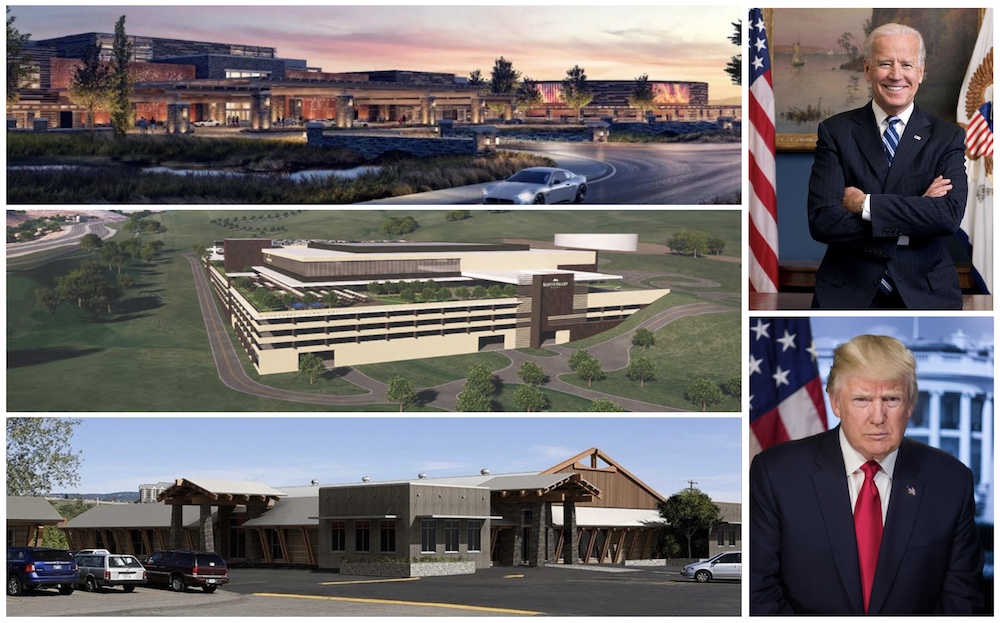
- Details
- By Chez Oxendine
- Gaming
Three West Coast tribes won federal approval in the Biden administration's final weeks to build controversial casinos miles away from their reservations. Tribal leaders from opposing nations are wondering: Will the incoming Trump administration shut them down when he takes office?
It’s not just an idle question. We’ve seen this movie before.
The Coquille Indian Tribe, the Scotts Valley Band of Pomo Indians, and the Koi Nation all won Interior Department approval for new land to be taken into trust, paving the way for casinos. The locations aren't on their current reservations, but are tied to the tribes by ancestral claims or because they’re in a tribe’s service area — a move that concerns neighboring tribes.
The timing may feel familiar to tribal leaders who’ve been around for a while. Back in 2017, the Bureau of Indian Affairs (BIA) approved the Coquille tribe’s casino land during the Obama administration’s last days in office. Shortly after Trump took office, the BIA revoked the decision. Now, Biden’s team has approved it again, along with the other two projects.
“(Interior) Secretary (Deb) Haaland is following in the steps of the Obama BIA, issuing a decision that, were it legitimate, would have been approved long ago and in the light of day, not in the 11th hour before leaving office,” Cow Creek Chairman Carla Keene said in a statement. “It perpetuates an inaccurate history and will cause irreparable harm to the historical, cultural, environmental, and economic interests of the Indigenous people who occupied those lands before they were taken.”
Keene said tribes opposing the Coquille casino would petition the Trump administration to revoke the BIA’s decision. Andy Mejia, chairperson of the Lytton Rancheria, made a similar pronouncement in a press release detailing the Rancheria’s opposition to the Scotts Valley Band of Pomo Indians’ plans for a Vallejo, Calif. casino following another BIA approval.
“This fight is far from over. We will pursue every legal avenue to protect our ancestral lands and prevent these harmful projects from moving forward,” Mejia said. “We urge the next administration to restore fairness and transparency in the federal decision-making process and to prioritize consultation with tribes whose lands and futures are most affected.”
Mejia warned that approving casinos so far from existing reservation land could establish a “dangerous precedent” for states regulating gaming outside of tribal lands.
“If this decision moves forward unchecked, what stops the next casino project from targeting major urban centers like San Francisco or Manhattan?” Mejia said. “The Interior Department has eliminated key geographic restrictions, creating a free-for-all that could jeopardize tribal relationships and erode the integrity of tribal sovereignty.”
Indian gaming experts I talked to aren’t convinced these approvals will stick. Kathryn Rand, who teaches Indian gaming law at the University of Nevada Las Vegas, thinks the courts will probably have the final say.
Rand said the cases will likely face fierce scrutiny in federal courts, citing the recent Loper Bright Enterprises vs. Raimondo Supreme Court decision, which gives federal court more power to challenge agency decisions like these BIA approvals.
“Loper-Bright allows challenges to federal agency decisions that wouldn’t have gone ahead before,” Rand told Tribal Business News. “There will be a lot more opportunities for the courts to review things, and that’s where we might see this challenged.”
If courts return the decision to the BIA, UNLV political scientist Dr. Steven Light said that it wasn’t clear which way Trump’s administration would break on the existing decisions.
“Everyone wants to know what a Trump 2.0 administration is going to look like on all kinds of issues, and so we’re all looking for clues,” Light told me. “We do know who Trump's nominee for Interior Secretary is, of course [former North Dakota gov. Doug Burgum] but we don't know what his appointees will look like and what the BIA will look like and how closely in the Interior they will pay attention to the actions of the Biden administration.”
Past numbers might offer clues. Trump’s first administration placed only 75,000 acres of land in trust, compared to 560,000 acres under President Obama’s team, per a report from The Hill. Trump also centralized control over these decisions in Washington rather than letting regional offices take the lead — a policy that Biden’s team quickly reversed in 2021.
The wild card here is Burgum, Trump’s pick for Interior Secretary. He’d be in charge of these BIA land-into-trust decisions, but so far hasn’t said much about Indian gaming. During his confirmation hearing last week, the topic never came up.
Bottom line: We’re watching a high-stakes game of political hot potato, with tribal economies hanging in the balance. Stay tuned.
Brian Edwards provided additional reporting.
